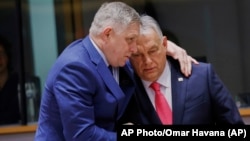Hungary and Slovakia are once again asking the European Union to remove asset freezes and visa bans on six Russian businessmen in order to secure the roll-over of the bloc’s individual sanctions regime on the Kremlin, which has been in place since Moscow’s full-scale invasion of Ukraine more than three years ago.
The sanctions, which now cover more than 2,600 individuals and firms after 18 rounds of EU restrictive measures, must be unanimously extended every six months, usually in mid-March and mid-September.
That list includes people such as Russian President Vladimir Putin and Foreign Minister Sergei Lavrov, as well as several oligarchs and businessmen accused of bankrolling or benefiting from Russia’s war effort.
In what has become a regular occurrence in Brussels, Hungary -- and more recently Slovakia -- have leveraged their vetoes to get some of the more high-profile names delisted. Both Central European countries enjoy close political relationships with the Kremlin and have argued that EU sanctions hit the European economy more than Russia’s.
In March, the Russian businessman Viatcheslav Moshe Kantor, Russian Sports Minister Mikhail Degtyaryov and Gulbahor Ismailova, the sister of billionaire tycoon Alisher Usmanov, were all removed from the blacklist after weeks of painstaking diplomatic negotiations among European officials.
Last year Arkady Volozh, the co-founder of the Russian Internet giant Yandex, Russian businessman Sergei Mndoiants, Jozef Hambalek, a Slovak national and head of the Russian nationalist Night Wolves motorcycle club in Europe, and Violetta Prigozhina, the mother of the late Russian businessman and Wagner mercenary leader Yevgeny Prigozhin, were removed in similar fashion.
According to several EU diplomats speaking on condition of anonymity, Slovakia this time wants to remove Usmanov and the businessman Mikhail Fridman. In addition to those two individuals, Hungary is also pushing for the delisting of oligarchs Dmitry Mazepin, Pyotr Aven, Musa Bazhaev, and Albert Avdolyan.
Most of these names have been put forward for delistings in previous rounds of sanctions renewal, apart from Avdolyan who was sanctioned by Brussels as recently as February this year.
The other EU member states have put forward an alternative solution: removing just one or two so-called "weak cases," meaning individuals that most likely would be delisted anyway as they were sanctioned based on weak evidence that wouldn’t hold up if it was challenged in court. On top of that, they also want the sanctions to be extended every 12 months instead of the current six.
Both Bratislava and Budapest have rejected this proposal in lower-level discussions in Brussels and the negotiations will now move up to EU ambassadors on September 3.
No deal is expected then, but with the deadline for sanctions renewal looming on September 15, some sort of compromise is expected to be reached next week.








